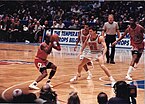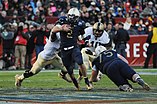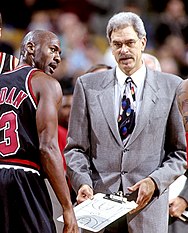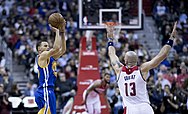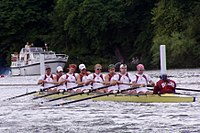Sports in the United States
| This article is part of a series on the |
| Culture of the United States |
|---|
 |
| Society |
| Arts and literature |
| Other |
| Symbols |
| By Region |
|
United States portal |
Sports in the United States are an important part of the nation's culture. Historically, the most popular sport has been baseball. However, in more recent decades, American football has been the most popular spectator sport based on broadcast viewership audience. Basketball has grown into the mainstream American sports scene since the 1980s, with ice hockey and soccer doing the same around the turn of the 21st century. These sports comprise the "Big Five".
In the first half of the 20th century, boxing and collegiate football were among the most popular sports after baseball. Golf, tennis, and collegiate basketball are other spectator sports with longstanding popularity. Tennis is currently considered to be the sixth most popular sport in the United States.[1] Most recently, mixed martial arts has been breaking records in attendance and broadcast viewership for all combat sports.
Based on revenue, the major professional sports leagues in the United States and Canada are the National Football League (NFL), Major League Baseball (MLB), the National Basketball Association (NBA), the National Hockey League (NHL), and Major League Soccer (MLS). At $16 billion in revenue, the NFL is the most valuable sports league in the world.[2]
The market for professional sports in the United States is about $69 billion, roughly 50% larger than that of all of Europe, the Middle East, and Africa combined.[3] All these leagues enjoy wide-ranging domestic media coverage and, except for Major League Soccer, all are considered the preeminent leagues in their respective sports in the world. Although American football does not have a substantial following in other nations, the NFL does have the highest average attendance (67,254) of any professional sports league in the world. MLB has the second highest average attendance of any sports league in the U.S. (29,293)[4] followed by MLS, the NBA, and the NHL. Of these five U.S.-based leagues, all but the NFL have at least one team in Canada.
Professional teams in all major sports in the United States operate as franchises within a league, meaning that a team may move to a different city if the team's owners believe there would be a financial benefit, but franchise moves are usually subject to some form of league-level approval.[5] All major sports leagues use a similar type of regular-season schedule with a post-season playoff tournament. In addition to the major league–level organizations, several sports also have professional minor leagues, active in smaller cities across the country.
As in Canada and Australia, sports leagues in the United States do not practice promotion and relegation, unlike most sports leagues in Europe. Another notable distinction is that most sports fans in the United States tend to follow more than one team sport, depending on the time of year, unlike the case in many parts of the world where fans might avidly follow only one team sport such as soccer or baseball. Thus, it is possible for a U.S. sports fan who follows multiple sports to spend practically every single day of the year watching professional sports, since there is no time of year when all the Big Five leagues would be off-season.
Sports are particularly associated with education in the United States, with most high schools and universities having organized sports, and this is a unique sporting footprint for the U.S. College sports competitions play an important role in the American sporting culture, and college basketball and college football are more popular than professional sports in some parts of the country. The major sanctioning body for college sports is the National Collegiate Athletic Association (NCAA). Colleges collectively receive billions of dollars from TV deals, sponsorships, and ticket sales. In 2019, the total revenue generated by NCAA athletic departments added up to $18.9 billion.[6]
Based on Olympic Games, World Championships, and other major competitions in respective sports, the United States is the most successful nation in the world in baseball, basketball, athletics, swimming, lacrosse, beach volleyball, figure skating, golf, boxing, diving, shooting, rowing and snowboarding, and is one of the top five most successful nations in tennis, ice hockey, wrestling, gymnastics, volleyball, speed skating, alpine skiing, bobsleigh, equestrian, sailing, cycling, weightlifting and archery, among others. This makes the United States the most successful sports nation in the world. The United States has been referred to by some as the Hegemon of World Sports.[7][8][9][10][11][12] The United States has placed first in the Summer Olympic medal table 19 times out of 30 Summer Olympics and 29 appearances. Unlike most other nations, the United States government does not provide funding for sports nor for the United States Olympic & Paralympic Committee.[13][14][15][16]
History
[edit]
American football, indoor American football, baseball, softball, and indoor soccer evolved out of older British (Rugby football, British baseball, Rounders, and association football) sports.[17] However, basketball, volleyball, beach volleyball, racquetball, pickleball, skateboarding, snowboarding, Ultimate, wind-surfing, and Water Skiing are fully American inventions,[17] some of which have become popular in other countries and worldwide.[18]
Up until the American Civil War, cricket was a somewhat popular sport in the United States, with presidents such as George Washington and Abraham Lincoln having played or watched the game.[19][20] However, cricket at the time was a sport played over several days, and during the Civil War, troops preferred to play the newly rising game of baseball, which was much shorter in duration and did not require a special playing surface to be played.[21][22]
Olympics
[edit]American athletes have won a total of 2,764 medals (1,105 of them gold) at the Summer Olympic Games and another 330 (114 of them gold) at the Winter Olympic Games, making the United States the most prolific medal-winning nation in the history of the Olympics. The U.S. is ranked first in the all-time medal table even if all the incarnations of Russia and Germany are combined, leading the second-placed Russians by 430 gold and 957 total medals. These achievements are even more impressive considering the fact that the American Olympic team remains the only in the world to receive no government funding.[23][24][15]
The United States hosted both Summer and Winter Games in 1932, and has hosted more Games than any other country – eight times, four times each for the Summer and Winter Games:
- The 1904 Summer Olympics in St. Louis, 1932 Summer Olympics and 1984 Summer Olympics in Los Angeles; and the 1996 Summer Olympics in Atlanta;
- The 1932 Winter Olympics and 1980 Winter Olympics in Lake Placid, New York; the 1960 Winter Olympics in Squaw Valley, California; and the 2002 Winter Olympics in Salt Lake City, Utah.
Los Angeles will host the Summer Olympics for a third time in 2028. Salt Lake City will host the Winter Olympics for a second time in 2034, marking the tenth Olympics hosted in the United States.
The United States has won the most gold and overall medals in the Summer Olympic Games, even if the medal totals of the Soviet Union/CIS and Russia are combined, and has topped the medal table 19 times.[25] The country has won the second most gold and overall medals in the Winter Olympic Games, behind Norway, but has topped the medal table only one time, in 1932. If all of Germany's and Russia's incarnations are combined, the United States slips to fourth in the all-time Winter Olympic Games table.
Individual sports
[edit]Golf
[edit]This section needs expansion. You can help by adding to it. (October 2023) |
Golf is one of the most popular participation sports in the United States, with approximately 24 million people playing golf on a regular basis as of 2023.[26] Golf's origins can be traced back to 15th century Scotland, where players would hit a pebble around sandy dunes using a stick or primitive club. The game has evolved over centuries into the version played today, which involves hitting a small, dimpled ball into each hole on a course in as few strokes as possible.
Introduced to America in the late 19th century, it quickly gained favor among the upper class. The United States Golf Association was founded in 1894 to establish rules. Iconic courses like Augusta National and Pebble Beach have hosted legendary tournaments.
Key U.S. golf events include The Masters, PGA Championship, U.S. Open, and Ryder Cup. Legends like Jack Nicklaus and Tiger Woods have left a lasting mark on the sport, while talents such as Scottie Scheffler and Rory Mcllroy continue to shine.
Golf is now more accessible across demographics, offering a blend of relaxation and mental challenge. Advancements in equipment and training ensure its continued evolution.
Since the 1970s, the landscape of golf in the United States has seen significant advancements, particularly in the recognition of female players. This has been highlighted by increased support for women's golf programs, the expansion of women's tournaments, and greater representation of female golfers at all levels of the sport.[27] Babe Zaharias won 10 major championships and was an Olympic gold medalist. Nancy Lopez claimed 48 LPGA Tour titles, including three majors, in the 1970s and 1980s. Patty Berg, a founding member of the LPGA, won 15 majorss. Juli Inkster, a two-time Solheim Cup captain, captured seven major championships. More recently, Lexi Thompson has emerged as a top player, winning multiple LPGA events, including a major championship.
In 2020, nearly 25 million people or around 8% of the total population of the U.S., played golf on a golf course in the United States, according to the National Golf Foundation.[28]
Boxing
[edit]
The United States became the center of professional boxing in the early 20th century.[29] The National Boxing Association was founded in 1921 and began to sanction title fights. One of the most iconic figures is Rocky Marciano, who remains the only heavyweight champion to retire undefeated. Holding the World Heavyweight title from 1952 to 1956, Marciano’s aggressive style and unyielding determination made him a legend in the sport. Another prominent figure is Jack Dempsey, a heavyweight champion from 1919 to 1926, known for his fierce, fast-paced fighting style that captivated fans and made him one of the most popular athletes of his time. Joe Louis was an American professional boxer who competed from 1934 to 1951. He reigned as the world heavyweight champion from 1937 to 1949, and is widely considered to be one of the greatest heavyweight boxers of all-time.[30][31][32][33] Louis is widely regarded as the first person of African-American descent to achieve the status of a nationwide hero within the United States, and was also a focal point of anti-Nazi sentiment leading up to and during World War II.[34] Floyd Patterson, who became the youngest boxer to win the world heavyweight title at age 21, also left a lasting impact on the sport, defending his title in the early 1960s. Since the late 1990s, boxing has declined in popularity.[35][36][37]
Boxing in the 21st century has experienced a decline in mainstream appeal, largely due to the rise of mixed martial arts (MMA) and the dominance of other major sports. The sport faces several challenges, including a fragmented organizational structure, safety concerns for athletes, and ongoing controversies surrounding matches and governance. Despite these issues, boxing continues to maintain a dedicated fanbase and remains a significant part of American sports culture. As of 2021, boxing participation in the United States reached approximately 6.7 million people, indicating a robust growth in the sport's popularity.[38]
Women, however, were largely excluded from the professional scene for much of boxing's early history, as the sport was dominated by men. Women made significant strides in boxing in the late 20th century, with Christy Martin leading the way in the 1990s. Known as "The Coal Miner’s Daughter." Her success opened doors for more female athletes. In the 21st century, champions like Laila Ali, the daughter of Muhammad Ali, and Claressa Shields further elevated women's boxing
Popular team sports
[edit]Overview
[edit]The most popular team sports in the United States are American football, baseball, basketball, ice hockey, and soccer. All five of these team sports are popular with fans, are widely watched on television, have a fully professional league, are played by millions of Americans, enjoy varsity status at many Division I colleges, and are played in high schools throughout the country.

| Sport | Favorite spectator sport[39] |
TV viewing record (since 2010)1 |
Major professional league |
Participants (millions)[40] |
NCAA DI Teams (men + women) |
States (HS)2 |
|---|---|---|---|---|---|---|
| Football | 37% | 114.4 million | NFL | 8.9 million | 249 (249M + 0W) | 51 |
| Basketball | 11% | 30.8 million | NBA | 30.3 million | 698 (351M + 349W) | 51 |
| Baseball | 9% | 40.0 million | MLB | 19.1 million | 589 (298M + 291W) | 49 |
| Soccer | 7% | 29.3 million | MLS | 19.6 million | 531 (205M + 332W) | 51 |
| Ice hockey | 4% | 43.6 million | NHL | 3.1 million | 102 (61M + 41W) | 20 |
- TV viewing record measures the game with the most TV viewers in the U.S. since 2005 for each sport: 2015 Super Bowl,[41] 2016 NBA Finals Game 7,[42] 2016 World Series Game 7,[43] 2014 FIFA World Cup Final,[44] and 2010 Winter Olympics Gold medal ice hockey game.[45]
- The column titled "States (HS)" represents the number of states that sponsor the sport at the high school level. For the purpose of this table, Washington, D.C. is counted as a state.[46]
The five most popular sports teams on Instagram from the United States as of October 4, 2024:[47][48][49][50][51]
| # | Team | Sport | Followers |
|---|---|---|---|
| 1 | Golden State Warriors | Basketball | 32.4 million |
| 2 | Los Angeles Lakers | Basketball | 24.6 million |
| 3 | Inter Miami | Soccer | 17.1 million |
| 4 | Cleveland Cavaliers | Basketball | 16.5 million |
| 5 | Chicago Bulls | Basketball | 10.1 million |
American football
[edit]Football has the most participants of any sport at both high school and college levels, the vast majority of its participants being male.[52][53] Millions watch college football throughout the fall months, and some communities, particularly in rural areas, place great emphasis on their local high school football teams.
College football in the 20th century grew from a regional sport into a national phenomenon. In the early years (1900-1940s), the game gained popularity with top schools like Yale and Harvard, and conferences such as the Big Ten and SEC were formed. The popularity of college and high school football in areas such as the Southern United States (Southeastern Conference) and the Great Plains (Big 12 Conference and Big Ten Conference) stems largely from the fact that these areas historically generally did not possess markets large enough for a professional team.[54] The first major bowl game, the Rose Bowl, was played in 1902, and the sport's popularity increased with television broadcasts in the 1950s. From the 1950s to the 1970s, legendary coaches like Bear Bryant and Knute Rockne shaped the game, and the integration of African American players began to break racial barriers. The 1980s and 1990s saw the rise of powerhouse teams such as Miami and Nebraska, while the BCS system was introduced to determine the national champion. By the end of the century, college football had become a major part of American culture, with game days and traditions uniting fans and communities across the nation. Nonetheless, college football has a rich history in the United States, predating the NFL by decades, and fans and alumni are generally very passionate about their teams.

The NFL has the highest average attendance (67,591) of any professional sports league in the world and has the highest revenue[55] out of any single professional sports league.[56] The NFL has two conferences, the AFC and the NFC. The AFC has 4 divisions (AFC East, AFC North, AFC South, and AFC West). The NFC also has 4 divisions (NFC East, NFC North, NFC South, and NFC West.) Each division has 4 teams, with a total of 32 teams in the NFL.[57]

The National Football League (NFL) in the 20th century underwent significant development, transforming from a regional league to a dominant force in American sports. Established in 1920 as the American Professional Football Association (APFA), it was renamed the NFL in 1922. Early years were marked by organizational instability and competition with other football leagues. However, the 1930s saw key innovations such as the introduction of the NFL Draft and a championship game, which contributed to the league's growing popularity. The 1950s and 1960s marked a period of expansion, with television broadcasts increasing national exposure. The creation of the Super Bowl in 1967, following the merger between the NFL and the American Football League (AFL), solidified the league's prominence. The 1970s saw further expansion and the rise of dominant teams like the Pittsburgh Steelers, while the 1980s and 1990s were characterized by increased commercialization, lucrative television contracts, and the emergence of star players. By the end of the 20th century, the NFL had firmly established itself as the most popular sport in the United States, with the Super Bowl becoming one of the most-watched events globally. During the 20th century, several star players helped shape the NFL's growth and popularity. Some of the most notable include: Red Grange, Johnny Unitas, Jim Brown, Vince Lombardi, Joe Namath and Terry Bradshaw.
Baseball
[edit]Baseball and a variant, softball, are popular participatory sports in the U.S. Baseball was the first professional sport in the United States.[58][59][60] The highest level of baseball in the U.S. and the world is Major League Baseball. There are a total of 30 MLB teams. The World Series of Major League Baseball is the culmination of the sport's postseason each October. It is played between the winner of each of the two leagues, the American League and the National League, and the winner is determined through a best-of-seven playoff.
The New York Yankees are noted for having won more titles than any other U.S. major professional sports franchise. The Yankees' chief rivals, the Boston Red Sox, also enjoy a huge following in Boston and throughout New England. The Philadelphia Phillies of the National League are the oldest continuous, one-name, one-city franchise in all of professional American sports,[61] and enjoy a fanbase renowned for their rabid support of their team throughout Philadelphia and the Delaware Valley, and have famously been dubbed as the "Meanest Fans in America".[62]
Every four years in March, the World Baseball Classic is held, which is the national team game, the most popular baseball national team game.[63] In the 20th century, MLB became a defining part of American culture. The century began with the formation of the American League in 1901, creating a two-league system with the National League. The first World Series was held in 1903. The Black Sox Scandal of 1919, in which several Chicago White Sox players were accused of fixing the World Series, led to the creation of the Commissioner of Baseball role to enforce stricter oversight. The 1920s and 1930s were marked by the dominance of Babe Ruth, whose power hitting changed the way the game was played, and the Yankees became a dominant force in baseball. In 1947, Jackie Robinson broke the color barrier, becoming the first African American player in MLB, marking a pivotal moment in both sports and civil rights. The 1950s and 1960s saw MLB expand with the relocation of teams like the Los Angeles Dodgers and San Francisco Giants to California, while stars like Mickey Mantle, Joe DiMaggio, and Willie Mays became household names. The 1970s brought the rise of the Cincinnati Reds’ Big Red Machine, and the 1980s and 1990s saw the league’s financial growth and the rise of free agency. Despite the 1994 strike that canceled the World Series, the 1998 home run race between Mark McGwire and Sammy Sosa revived interest in the sport. By the end of the century, MLB had firmly established itself as America’s pastime, with a rich history shaped by legendary players and transformative events.
Women have played an important role in the development of both baseball and softball. The All-American Girls Professional Baseball League (AAGPBL), established during World War II, provided opportunities for women in baseball, with players like Dottie Kamenshek, often considered one of the league's greatest players. In addition, softball has become a prominent sport for women, with the inclusion of women’s softball in the Olympics since 1996, and athletes like Jennie Finch, who became one of the most recognized softball pitchers in the world, helping to elevate the sport's visibility.
Basketball
[edit]In high school basketball, Indiana has 10 of the 12 largest high school gyms in the United States,[65] and is famous for its basketball passion, known as Hoosier Hysteria.
Of those Americans citing their favorite sport, basketball is ranked second (counting amateur levels) behind football.[66] However, in regards to revenue the NBA is ranked third in popularity.[67] More Americans play basketball than any other team sport, according to the National Sporting Goods Association, with over 26 million Americans playing basketball. Basketball was invented in 1891 by Canadian physical education teacher James Naismith in Springfield, Massachusetts.
The National Basketball Association (NBA) is the world's premier professional basketball league[68] and one of the major professional sports leagues of North America. It contains 30 teams (29 teams in the U.S. and 1 in Canada) that play an 82-game season from October to June. After the regular season, eight teams from each conference compete in the playoffs for the Larry O'Brien Championship Trophy. Professional basketball is most followed in cities where there are no other sports teams in the four major professional leagues, such as in the case of the Oklahoma City Thunder,[69] the Sacramento Kings, the San Antonio Spurs, the Memphis Grizzlies, or the Portland Trail Blazers.
NBA began in 1946 with the formation of the Basketball Association of America (BAA), which merged with the National Basketball League (NBL) in 1949 to create the NBA. The league initially faced challenges related to finances and public interest. However, the 1950s saw the rise of George Mikan, a dominant center for the Minneapolis Lakers, whose success helped establish the league’s credibility. In the 1960s, the NBA gained wider popularity, driven by the fierce rivalry between the Boston Celtics, led by Bill Russell, and the Los Angeles Lakers, featuring stars like Jerry West and Elgin Baylor.
The Women's National Basketball Association (WNBA) is the premier professional women's basketball league in the United States, founded in 1996. The league consists of 12 teams and runs from May to September, with playoffs to determine the champion. Notable players include Diana Taurasi, Sue Bird, Lisa Leslie, and Maya Moore. Although historically lower-paying than the NBA, the WNBA has seen improvements in player salaries and sponsorships in recent years. Many players also compete overseas during the off-season to supplement their income. The league features a blend of American and international talent, with players from countries like Australia, Bosnia, and Canada making significant contributions. The WNBA has played a key role in promoting women's professional sports in the U.S. and continues to grow in popularity.
Soccer
[edit]With an average attendance of over 21,000 per game (prior to COVID-19), Major League Soccer has the third-highest average attendance of any sports league in the U.S. after the National Football League (NFL) and Major League Baseball (MLB),[70] and is the ninth-highest attended professional soccer league worldwide.[71]
The NWSL most recently expanded to 14 teams in 2024 and is expected to add a 15th team in 2026.[72]
In 2024, the NWSL received competition as a top-level league with the launch of the USL Super League (USLS), which started play with 8 teams. Shortly before its first season, USLS received Division I sanctioning from the U.S. Soccer Federation, placing it at the same level as the NWSL. Unlike most U.S. soccer leagues, USLS is playing a fall-to-spring season, in line with most European leagues and the sport's international calendar.[73]
The Major Arena Soccer League (MASL) is a North American professional indoor soccer league. MASL is the highest level of arena soccer in the North America and the world.[74]
Ice hockey
[edit]Right: The New York Rangers attempt to distract during the 2008 Stanley Cup playoffs. The playoff series was the fifth to feature the Devils–Rangers rivalry.
The U.S. now has more youth hockey players than all other countries, excluding Canada, combined.[75] USA Hockey is the official governing body for organized ice hockey in the United States. The United States Hockey Hall of Fame is located in Eveleth, Minnesota.
The U.S.-based National Hockey League is the premier hockey league in the world. Historically, the vast majority of NHL players had come from Canada, with a small number of Americans. As late as 1969–70, Canadian players made up 95 percent of the league.[75]
However, the modern NHL has a much larger percentage of American players. At the start of the 2023–24 NHL season, American players made up 29.1 percent of the league, compared to 41.7 percent from Canada and 29.2 percent from various European countries.[76]
Calendar of the major men's and women's professional sports leagues in the U.S.
[edit]| January | February | March | April | May | June | July | August | September | October | November | December |
|---|---|---|---|---|---|---|---|---|---|---|---|
| NFL (Football) | NFL (Football) | ||||||||||
| MLB (Baseball) | |||||||||||
| NBA (Basketball) | NBA (Basketball) | ||||||||||
| MLS (Soccer) | |||||||||||
| NHL (Ice hockey) | NHL (Ice hockey) | ||||||||||
| January | February | March | April | May | June | July | August | September | October | November | December |
|---|---|---|---|---|---|---|---|---|---|---|---|
| NWSL (Soccer) | |||||||||||
| WNBA (Basketball) | |||||||||||
| PWHL (Ice hockey) | |||||||||||
Other team sports
[edit]Overview
[edit]The following table shows additional sports that are played by over 500,000 people in the United States.
| Sport | Participants (millions) |
NCAA teams (men + women)[77] |
Pro league(s) |
Attendance record1 |
TV Viewership record2 |
Olympic sport |
|---|---|---|---|---|---|---|
| Volleyball | 10.7 million[40] | 1,122 (155M + 1,067W) |
NVA; PVF | 92,003 | 794,000 | Yes |
| Rugby union | 1.4 million[78] | over 600 (go to college rugby) |
MLR, PR7s | 61,500 | 9,000,000 | Yes |
| Lacrosse | 0.7 million[79] | 921 (397M + 524W) |
NLL; PLL | 52,004 | 476,000 | Yes |
- Attendance record measures highest single-game attendances. Attendance records are: Volleyball: 2023 Volleyball Day in Nebraska at Memorial Stadium, Lincoln;[80] Rugby: 2014 New Zealand vs. Ireland in Chicago;[81] and Lacrosse: 2007 NCAA Division I men's championship semifinals.[82]
- TV viewership records are: Volleyball: 2010 NCAA women's championship on ESPN2; Rugby: 2018 Rugby World Cup Sevens on NBC; Lacrosse: 2016 NCAA championship on ESPN2
Lacrosse
[edit]
Lacrosse is a team sport that is believed to have originated with the Iroquois and the Lenape. The sport is most popular in the East Coast area from Maryland to New York. While its roots remain east, lacrosse is currently the fastest growing sport in the nation.[83] The National Lacrosse League is the professional Box lacrosse league, while the Premier Lacrosse League is the professional Field Lacrosse league. Major League Lacrosse was a semi-professional Field Lacrosse league that was operating nationally before merging into PLL in 2020.[84]
Volleyball
[edit]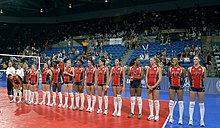
Volleyball is played in the United States, especially at the college and university levels.[original research?] Unlike most Olympic sports which are sponsored widely at the collegiate level for both sexes, the women's college volleyball teams are more common than men's college volleyball teams. In the 2011–12 school year, over 300 schools in NCAA Division I alone (the highest of three NCAA tiers) sponsored women's volleyball at the varsity level,[85] while fewer than 100 schools in all three NCAA divisions combined sponsored varsity men's volleyball, with only 23 of them in Division I.[86] Men's volleyball has grown at the non-scholarship NCAA Division III level in the 21st century, with a national championship established in 2012. As of the most recent 2022 season (2021–22 school year), 113 schools sponsor the sport at that level. At the same time, 26 D-I and 31 D-II members sponsored men's volleyball at the National Collegiate level, defined for the purposes of that sport as the combination of Divisions I and II.[87][note 1] The National Volleyball Association is the professional men's volleyball league, while the Pro Volleyball Federation is the professional women's volleyball league.
Rugby union
[edit]
Rugby union participation in the U.S. has grown significantly in recent years, growing by 350% between 2004 and 2011.[88] A 2010 survey by the National Sporting Goods Manufacturers Association ranked rugby union as the fastest-growing sport in the U.S.[89]
Rugby union is the fastest growing college sport and sport in general in the United States.[90][91][92]
Minor sports
[edit]- Australian rules football in the United States
- Bandy in the United States
- Cricket in the United States
- Field hockey in the United States
- Handball in the United States
Organization of American sports
[edit]College sports
[edit]The most practiced college sports, measured by NCAA reporting on varsity team participation,[93] are: (1) football (64,000), (2) baseball/softball (47,000), (3) track and field (46,000),[94] (4) soccer (43,000), (5) basketball (32,000), (6) cross-country running (25,000), and (7) swimming/diving (20,000). The most popular sport among female athletes is soccer, followed closely by track and field.[53]
High school sports
[edit]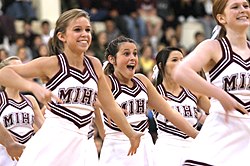
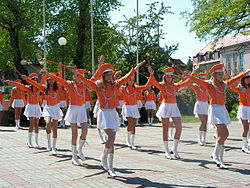
Most public high schools are members of their respective state athletic association, and those associations are members of the National Federation of State High School Associations (NFHS). Some states have separate associations for public and non-public high schools.
The 2018–19 school year was the first in 30 years to see a decrease in high school sports participation. Increases through the previous decades had been largely driven by growth in girls' participation.[95] The high school sports with the highest number of participants for 2018–19 are:
- Team sports[95]
- Football[hs 1] – 1,008,417
- Basketball – 939,836
- Baseball/Softball[hs 2] – 854,859
- Soccer – 853,182
- Volleyball – 516,371
- Individual sports[95]
- Track & field (outdoor) – 1,093,621
- Cross country – 488,640
- Tennis – 348,750
- Swimming & diving – 309,726
- Wrestling – 268,565
- Notes
Popular high school sports in various regions of the U.S. include the Texas High School football championships, the Indiana basketball championships, and ice hockey in Minnesota. The Minnesota State High School Hockey Tournament is the largest high school sporting event in the country, with average attendance to the top tier, or "AA", games over 18,000.[96]
Sports media in the United States
[edit]Sports have been a major part of American broadcasting since the early days of radio.[97] Today, television networks and radio networks pay millions (sometimes billions) of dollars for the rights to broadcast sporting events. Contracts between leagues and broadcasters stipulate how often games must be interrupted for commercials. Because of all of the advertisements, broadcasting contracts are very lucrative and account for the biggest chunk of major professional teams' revenues. Broadcasters also covet the television contracts for the major sports leagues (especially in the case of the NFL) in order to amplify their ability to promote their programming to the audience, especially young and middle-aged adult males.[98]
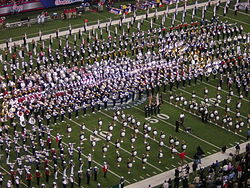
The advent of cable and satellite television has greatly expanded sports offerings on American TV.[99] ESPN, the first all-sports cable network in the U.S., went on the air in 1979. It has been followed by several sister networks and competitors. Some sports television networks are national, such as CBS Sports Network and Fox Sports 1, whereas others are regional, such as NBC Sports Regional Networks, Bally Sports and Spectrum Sports.[100] General entertainment channels like TBS, TNT, and USA Network also air sports events. Some sports leagues have their own sports networks, such as NFL Network, MLB Network, NBA TV, NHL Network, Big Ten Network, Pac-12 Network and SEC Network. Some sports teams run their own television networks as well.[101]
Sports are also widely broadcast at the local level, ranging from college and professional sports down to (on some smaller stations) recreational and youth leagues.[99] Internet radio has allowed these broadcasts to reach a worldwide audience.
| Sports rights | Sport | National TV contract | Total Revenues | Revenues per year | Ref |
|---|---|---|---|---|---|
| National Football League (NFL) | American football | CBS, Fox, NBC, ESPN, YouTube, Verizon, Amazon |
$56 billion | $7 billion | |
| National Basketball Association (NBA) | Basketball | ABC/ESPN, TNT/Max | $24 billion | $2.7 billion | [102] |
| Major League Baseball (MLB) | Baseball | Fox, ESPN, TBS/Max, Peacock | $12 billion | $1.6 billion | |
| March Madness | Basketball | CBS, Turner/Max | $8.8 billion | $1.1 billion | |
| Big Ten Conference (Big Ten or B1G) |
College sports | Fox, NBC, CBS | $7.0 billion | $1.0 billion | [103] |
| NASCAR | Auto racing | NBC/USA, Fox | $8.2 billion | $820 million | |
| Olympic Games | Multi-sport | NBC | $7.8 billion | $705 million | |
| College Football Playoff | American football | ESPN | $5.6 billion | $470 million | |
| National Hockey League (NHL) | Ice hockey | ABC, ESPN, TNT/Max | $4.445 billion | $635 million | [104] |
| Pac-12 Conference (Pac-12) |
College sports | Fox | $3.0 billion | $250 million | |
| Atlantic Coast Conference (ACC) | College sports | ESPN | $0.8 billion | $55 million | |
| Big 12 Conference (Big 12) |
College sports | Fox, ESPN | $2.6 billion | $200 million | |
| Major League Soccer (MLS) | Soccer | MLS Season Pass (Apple TV) |
$2.5 billion | $250 million | [105] |
| U.S. Open (golf) | Golf | NBC | $1.1 billion | $93 million | |
| FIFA World Cup | Soccer | Fox, Telemundo | $1.0 billion | $125 million | |
| English Premier League | Soccer | NBC | $1.0 billion | $167 million | |
| Southeastern Conference (SEC) | College sports | ESPN, ABC | $0.8 billion | $55 million | |
| US Open (tennis) | Tennis | ESPN | $0.8 billion | $70 million | |
| World Baseball Classic (WBC) | Baseball | Fox | N/A | N/A | |
| IndyCar Series | Auto Racing | NBC, USA, Peacock | N/A | N/A |
Most popular sports in the United States
[edit]In the broadest definition of sports—physical recreation of all sorts—the United States Census Bureau, in 2007, found the four most popular sports among the general population of the United States are exercise walking (90 million), exercising with equipment (53 million), swimming (52 million) and camping (47 million). The most popular competitive sport (and fifth most popular recreational sport) is bowling (43 million). Other popular sports included fishing (35 million), bicycling (37 million), weightlifting (33 million), aerobics (30 million), and hiking (28 million).[106]
According to a January 2018 poll by Gallup, 37% of Americans consider football their favorite spectator sport, while 11% prefer basketball, 9% baseball, and 7% soccer. There is some variation by viewer demographics. Men show a stronger preference for football than women, conservatives a stronger preference than liberals, and those over 35 a stronger preference than those under 35. In all groups, however, football is still the most popular. Basketball and soccer are more popular among liberals than conservatives.[107]
For three years in a row, 2021, 2022 and 2023 pickleball was named the fastest growing sport in the United States by the Sports and Fitness Industry Association (SFIA).[108][109][110] Between 2019 and 2023, the SFIA estimated the number of US players increased almost 223% to 13.6 million. In March 2023 the Association of Pickleball Players estimated the number of US pickleball players in the previous 12 months had surpassed 48 million.[111]
Sports leagues in the United States
[edit]The following table shows the major sports leagues, professional and collegiate, which average over 15,000 fans per game and that have a national TV contract that pays rights fees.
| League | Sport | Teams | National TV contract | Average Attendance |
Total Annual Attendance |
Ref |
|---|---|---|---|---|---|---|
| Major League Baseball (MLB) | Baseball | 30 | Fox, FS1, ESPN, TBS, MLBN | 28,187 | 68,494,752 | [112] |
| National Basketball Association (NBA) | Basketball | 30 | ABC, ESPN, TNT, NBATV | 17,857 | 21,964,447 | [113] |
| National Hockey League (NHL) | Ice hockey | 32 | ABC, ESPN, TNT, NHLN | 17,500 | 21,525,777 | [114] |
| National Football League (NFL) | American football | 32 | CBS, Fox, NBC, ESPN, NFLN | 67,100 | 17,177,581 | [115] |
| Major League Soccer (MLS) | Soccer | 29 | Apple, Fox, Univision | 22,111 | 10,900,804 | [116] |
| Southeastern Conference (SEC) | American football | 16 | ABC, ESPN | 77,334 | 7,501,356 | [117] |
| Big Ten Conference (B1G) | American football | 18 | CBS, NBC, Fox | 66,788 | 6,344,869 | |
| Big 12 Conference (XII) | American football | 16 | ESPN, Fox | 54,394 | 5,004,208 | |
| Atlantic Coast Conference (ACC) | American football | 17 | ABC, ESPN | 49,130 | 4,519,993 | |
| Pac-12 Conference (PAC) | American football | 2 | ABC, ESPN, Fox | 48,633 | 3,842,002 | |
| American Athletic Conference (The American) | American football | 14 | ABC, ESPN | 23,820 | 2,096,138 | |
| Mountain West Conference (MW) | American football | 12 | CBS, Fox Sports | 23,223 | 1,741,746 | |
| Sun Belt Conference (Sun Belt) | American football | 14 | ESPN | 20,837 | 1,771,134 | |
| Conference USA
(CUSA) |
American football | 10 | CBS-SN, ESPN | 15,860 | 872,274 |
See also
[edit]- Sports in the United States by state
- Sports Museum of America
- Professional sports in the Western United States
- Record attendances in United States club soccer
- Homosexuality in sports in the United States
- Western sports
Notes
[edit]- ^ The NCAA officially labels all championship events that are open to members of more than one NCAA division as "National Collegiate" championships. The only exception to this rule is in men's ice hockey, whose championship event remains branded as the "Division I" championship because the NCAA formerly sponsored a D-II championship in that sport.
References
[edit]- ^ "Most Popular Sports in the United States". November 7, 2023. Retrieved March 29, 2024.
- ^ "10 Most Profitable Sports Leagues in the World". November 19, 2021.
- ^ Global sports market to hit $141 billion in 2012. Reuters. Retrieved on July 24, 2013.
- ^ "MLB average attendance 2021".
- ^ Antitrust Issues in Relocation of Professional Sports Franchises: Hearing Before the Subcommittee on Antitrust, Business Rights, and Competition of the Committee on the Judiciary, United States Senate, One Hundred Fourth Congress, First Session ... November 29, 1995. U.S. Government Printing Office. 1996. ISBN 978-0-16-053448-5.
- ^ "Infographic: U.S. College Sports Are a Billion-Dollar Game". July 2, 2021.
- ^ "Greatest Sporting Nation". Greatest Sporting Nation.
- ^ "Top Sporting Nations – Biggest Global Sports". Biggest Global Sports.
- ^ "Olympics medal table by country". Statista.
- ^ "1,000 times gold – The thousand medals of Team USA – Washington Post". The Washington Post.
- ^ "World Ranking of Countries in Elite Sport". World Sport Ranking.
- ^ "Top 10 Greatest Sports Countries". The Top Tens.
- ^ "United States Olympic & Paralympic Committee". Archived from the original on June 20, 2013.
- ^ Skousen, Mark. "Privately Funded USA Olympic Team...Wins!". Townhall.
- ^ a b "U.S. Has Done Fine with No Government Department of Sports". National Review. August 10, 2016.
- ^ Bachman, Rachel (April 12, 2020). "WSJ News Exclusive | U.S. Olympic Sports Groups Seek Government Aid". The Wall Street Journal.
- ^ a b Kinetics (Organization), Human; Hanlon, Thomas W. (2009). The Sports Rules Book. Human Kinetics. ISBN 978-0-7360-7632-6.
- ^ Kinetics (Organization), Human; Hanlon, Thomas W. (2009). The Sports Rules Book. Human Kinetics. ISBN 978-0-7360-7632-6.
- ^ Magazine, Smithsonian. "The History of Cricket in the United States". Smithsonian Magazine. Retrieved January 5, 2023.
- ^ Guardian Staff (July 27, 2004). "What goes around, comes a-rounders". The Guardian. Retrieved January 5, 2023.
- ^ "Why cricket and America are made for each other". The Economist. ISSN 0013-0613. Retrieved January 5, 2023.
- ^ Crown, Daniel (October 19, 2017). "The Battle Between Baseball and Cricket for American Sporting Supremacy". Atlas Obscura. Retrieved January 5, 2023.
- ^ "Not Found".
{{cite web}}: Missing or empty|url=(help) - ^ "Privately Funded USA Olympic Team...Wins!".
- ^ "Bolavip US – Sports news". bolavip.com.
- ^ "The Graffis Report". National Golf Foundation. Retrieved February 27, 2021.
- ^ "Golf Digest". March 29, 2024.
- ^ "Rivers Edge Golf Bend".
- ^ "Why Boxing Is Becoming Less Relevent [sic] In America". Bleacher Report. Retrieved September 23, 2016.
- ^ Joe Louis|Britannica
- ^ Tyson Fury sets sights on Joe Louis' record of 25 consecutive title defences
- ^ "All Time Rankings". International Boxing Research Organization. March 2005. Archived from the original on July 7, 2007. Retrieved June 19, 2009.
- ^ "Joe Louis (1914–1981)". The American Experience The Fight. Public Broadcasting System. September 22, 2004. Retrieved June 24, 2012.
- ^ John Bloom; Michael Nevin Willard, eds. (2002). Sports Matters: Race, Recreation, and Culture. New York: New York University Press. pp. 46–47. ISBN 978-0-8147-9882-9.
- ^ "Will McGregor v Mayweather save American boxing – or bury it?". The Guardian. August 19, 2017. Retrieved August 19, 2017.
- ^ Flinn, Jenny (March 9, 2016). "The rise and rise of ultimate fighting (and why boxing is now so passé)". The Conversation.
- ^ Campbell, Morgan (March 31, 2011). "Boxing takes a hit from MMA's growing popularity". Toronto Star.
- ^ "Statista".
- ^ "Poll: Soccer nearly cracks America's top three favorite spectator sports", Philly Voice January 9, 2018. (citing a December 2017 Gallup poll)
- ^ a b "Table 1249. Participation in Selected Sports Activities: 2009" (PDF). October 21, 2011. Archived from the original (PDF) on October 21, 2011. Retrieved October 4, 2017.
- ^ Gough, Christina (February 11, 2021). "Super Bowl TV Viewership in the U.S. 1990–2021". Statista. Retrieved May 31, 2021.
- ^ Frank Pallotta (June 20, 2016). "NBA Finals game 7 audience tops 30 million, biggest in 18 years". New York: CNN. Retrieved June 25, 2016.
- ^ A.J. Pérez. "World Series TV ratings: Epic Game 7 was off the charts". USA Today. Washington, D.C.: Gannett. Retrieved November 24, 2016.
- ^ Jonathan Tannenwald. "2014 World Cup final sets some U.S. TV records, but not all". The Philadelphia Inquirer. Philadelphia. Retrieved March 28, 2015.
- ^ "Olympic final most-watched hockey game in 30 years". Toronto: NHL Enterprises, L.P. Retrieved August 13, 2015.
- ^ The only states that sponsor neither baseball nor softball are South Dakota and Wyoming. No states in the Southern United States sponsor ice hockey.
- ^ "Instagram". www.instagram.com. Retrieved October 4, 2024.
- ^ "Instagram". www.instagram.com. Retrieved October 4, 2024.
- ^ "Instagram". www.instagram.com. Retrieved October 4, 2024.
- ^ "Instagram". www.instagram.com. Retrieved October 4, 2024.
- ^ "Instagram". www.instagram.com. Retrieved October 4, 2024.
- ^ "Table 1211. Participation in High School Athletic Programs by Sex: 1979 to 2008" (PDF). March 27, 2010. Archived from the original (PDF) on March 27, 2010. Retrieved October 4, 2017.
- ^ a b "Table 1210. Participation in NCAA Sports by Sex: 2007 to 2008" (PDF). March 27, 2010. Archived from the original (PDF) on March 27, 2010. Retrieved October 4, 2017.
- ^ Peirce, Neal R.; Peirce, Nr (1973). The Great Plains States of America: People, Politics, and Power in the Nine ... – Neal R. Peirce – Google Books. W. W. Norton & Company. ISBN 9780393053494. Retrieved March 28, 2015.
- ^ "Major sports leagues all make a lot of money, here's how they do it". Global Sport Matters. March 7, 2019.
- ^ "NFL is world's best attended pro sports league". ABS-CBN News. Agence France-Presse. January 6, 2013. Archived from the original on October 6, 2013. Retrieved January 30, 2013.
- ^ "NFL.com | Official Site of the National Football League". NFL.com. Retrieved December 12, 2023.
- ^ "Government, Community, and Sports Teams: Tax Credits". The Policy Circle.
- ^ "Major Professional Sports Leagues: The US & Canada". The Daily Gazette. Archived from the original on November 25, 2020. Retrieved November 26, 2020.
- ^ Philbrook, Sam (February 22, 2020). "What Is the Oldest Major Sports League in the U.S.?".
- ^ "Phillies Timeline: 1800s". History Highlights. Philadelphia Phillies. Archived from the original on January 29, 2007. Retrieved June 5, 2008.
- ^ "Eagles, Phillies top GQ list of 'Worst Fans in America'". Philadelphia Daily News. March 17, 2011. Retrieved June 13, 2015.
- ^ "World Baseball Classic Final Viewership: How many people watched the epic showdown between Team USA and Samurai Japan?". sportskeeda.com. March 23, 2023.,
- ^ "Is Steph Curry The Best Shooter Ever? Yes, Say Many of NBA's All-Time Marksmen". Bleacherreport.com. June 1, 2015. Retrieved June 1, 2015.
- ^ "largest Indiana high school gymnasiums". Indianahsbasketball.homestead.com. Archived from the original on July 12, 2011. Retrieved September 4, 2012.
- ^ "Football Still Americans' Favorite Sport to Watch". Gallup. January 4, 2018. Retrieved April 30, 2020.
- ^ "The Harris Poll". Harrisinteractive.com. Archived from the original on January 3, 2010. Retrieved September 25, 2016.
- ^ Rathborn, Jack (November 18, 2020). "NBA Draft 2020: What time does it start in the UK, who has the No 1 pick and how can I watch it?". The Independent. Archived from the original on May 24, 2022. Retrieved December 10, 2020.
The 2020 NBA Draft is here after days of juicy gossip surrounding trades as the world's greatest basketball league dominates the headlines during its offseason.
- ^ Simmons, Bill (June 13, 2012). "Thunder Family Values". Grantland.com. Retrieved July 13, 2012.
- ^ Major professional sports leagues in the United States and Canada#Attendance
- ^ MLSsoccer.com, The expansion, refs, Cascadia: MLS Commissioner Don Garber covers it all in annual address, February 27, 2013, http://www.mlssoccer.com/news/article/2013/02/27/expansion-refs-cascadia-commissioner-garber-covers-it-all-march-soccer-addre Archived March 22, 2015, at the Wayback Machine
- ^ "Report: NWSL to add teams in Boston, Utah and San Francisco Bay Area". ESPN. January 27, 2023. Retrieved January 29, 2023.
- ^ "USL Super League Receives Division One Sanctioning from U.S. Soccer and Confirms Field of Teams for Inaugural Season". USLSuperLeague.com (Press release). USL Super League. February 9, 2024. Retrieved February 9, 2024.
- ^ "Major Arena Soccer League (MASL)". Iowa Soccer. Archived from the original on January 25, 2022. Retrieved December 8, 2020.
- ^ a b Dryden, Ken (February 20, 2014). "Miracle Off Ice". Grantland.com. Retrieved February 20, 2014.
- ^ Szporer, Ryan (January 21, 2024). "NHLers by Country: On Top of Their Game and the World". thehockeywriters.com. Retrieved January 29, 2024.
- ^ "Who We Are: Composition and sport sponsorship of the NCAA membership". NCAA. September 1, 2019. Retrieved July 24, 2020.
- ^ "IRB Development Global Map" Archived July 7, 2014, at the Wayback Machine, International Rugby Board. Retrieved June 15, 2014.
- ^ "2011 Participation Survey". Archived from the original on June 18, 2013. Retrieved March 26, 2013.
- ^ Olson, Eric (August 30, 2023). "Nebraska volleyball stadium event draws 92,003 to set women's world attendance record". Associated Press. Retrieved August 30, 2023.
- ^ United States v. New Zealand, Soldier Field, Chicago.;
- ^ "Attendance Records" (PDF). 2019 NCAA Division I Men's Lacrosse Records. Retrieved March 18, 2019.
- ^ "Fastest Growing Sport". Business Insider. Retrieved October 13, 2019.
- ^ "NCAA Statistics". Stats.ncaa.org. Retrieved September 25, 2016.
- ^ "2011–12 Participation Study – Women's Sports" (PDF). NCAA Sports Sponsorship and Participation Rates Report, 1981–82 – 2011–12. NCAA. October 2012. p. 71. Retrieved January 4, 2013.
- ^ "2011–12 Participation Study – Men's Sports" (PDF). NCAA Sports Sponsorship and Participation Rates Report, 1981–82 – 2011–12. NCAA. October 2012. p. 72. Retrieved January 4, 2013.
- ^ "NCAA Membership Directory". NCAA. Retrieved May 10, 2022. Select the desired entries in the "Sport" and "Division" fields to the left of the map.
- ^ "Economic Impact Report on Global Rugby" (PDF). Archived from the original (PDF) on June 26, 2011. Retrieved September 25, 2011.
- ^ "Rugby is now the fastest growing sport in the U.S. And BIG changes to high school rugby - Your Hub". Archived from the original on March 21, 2012. Retrieved January 14, 2012.
- ^ "U.S Rugby Scholarships".
- ^ "Rugby: Fastest growing sport in the U.S. also one of the oldest". Global Sport Matters. July 19, 2018.
- ^ "Where Is Rugby the Most Popular Among Students: Comparison of US and UK Student Leagues". LoveRugbyLeague. October 17, 2020. Archived from the original on August 12, 2021. Retrieved December 10, 2020.
- ^ The NCAA defines a participant as someone who "as of the day of the varsity team's first scheduled contest: (a) is listed as a team member; (b) practices with the varsity team and receives coaching from one or more varsity coaches; or (c)received athletically-related student aid."
- ^ The NCAA does not give a number for total track and field, but breaks the figures into outdoor and indoor. The number given is for outdoor track and field. The total is likely to be somewhat higher.
- ^ a b c "2018–19 High School Athletics Participation Survey" (PDF). National Federation of State High School Associations. Retrieved December 26, 2019.
- ^ Wells, Nathan (March 7, 2015). "MN HS Tourney breaks attendance record". SB Nation College Hockey.
- ^ John Catsis, Sports Broadcasting (1996)
- ^ Chris Gratton, and Harry Arne Solberg, The economics of sports broadcasting (Routledge, 2007)
- ^ a b Catsis, Sports Broadcasting (1996)
- ^ Harry Arne Solberg and Knut Helland, "Sports broadcasting." Nordicom Review 32.2 (2011): 17–33.
- ^ Matthew D. Shank and Mark R. Lyberger, Sports marketing: A strategic perspective (Routledge, 2014).
- ^ "NBA to announce $24 billion TV deal". October 6, 2014. Retrieved January 12, 2018.
- ^ Rittenberg, Adam (August 18, 2022). "Big Ten completes 7-year, $7 billion media rights agreement with Fox, CBS, NBC". ESPN.com. Retrieved September 18, 2024.
- ^ "NHL's new TV rights, explained: What to know as ESPN, TNT replace NBC in USA". Sporting News. April 27, 2021. Retrieved February 2, 2022.
- ^ Gostomelsky, Adam (June 23, 2022). "A breakdown of Apple's Major League Soccer deal". Sports Media Watch. Retrieved July 18, 2022.
- ^ "Table 1212. Participation in Selected Sports Activities: 2007" (PDF). March 27, 2010. Archived from the original (PDF) on March 27, 2010. Retrieved October 4, 2017.
- ^ "Football Still Americans' Favorite Sport to Watch". Gallup. Retrieved June 5, 2018.
- ^ Porterfield, Carlie (July 26, 2022). "Here's Why Pickleball—The Fastest-Growing Sport in America—Is Bill Gates' Favorite Game". Forbes. Retrieved August 9, 2022.
- ^ "SFIA's Topline Participation Report Shows Strong Positive Trends Across All Sports and Fitness Categories". SFIA.org. Sports & Fitness Industry Association. Archived from the original on September 9, 2024. Retrieved September 13, 2024.
- ^ Definition, Beyond. "Pickleball Sees Unprecedented Growth: Will Require 25,000 Courts Built, $900 Million Investment to Keep Up With Demand". Sports and Fitness Industry Association. Retrieved April 3, 2024.
- ^ "New APP Research Reveals Nearly 50 Million Adult Americans Have Played Pickleball In The Last 12 Months; Average Age Drops To 35". APP. Association of Pickleball Players. March 29, 2023. Archived from the original on September 17, 2024. Retrieved October 29, 2024.
- ^ Brown, Maury (October 4, 2019). "From Terrible Teams To Rising Costs: Why MLB Attendance Is Down Over 7% Since 2015". Forbes. Retrieved October 9, 2019.
- ^ "NBA attendance even with last season's record mark" (Press release). National Basketball Association. April 11, 2019. Retrieved October 9, 2019.
- ^ "nhl Attendance Report – 2017". ESPN. Retrieved August 7, 2018.
- ^ McClung, Brandon (January 2, 2019). "NFL Attendance Lowest Since '10 Despite Chargers Rebound". Sports Business Daily. Retrieved October 9, 2019.
- ^ "MLS breaks season-long attendance records". www.sportsbusinessjournal.com. October 23, 2023. Retrieved January 29, 2024.
- ^ Murray, Chris (December 7, 2023). "MW football attendance analysis: Biggest risers and fallers year-over-year". Nevada Sports Net. Retrieved January 29, 2024.
Further reading
[edit]- Barbour, R. H. (1870-1944) A very prolific writer of sport stories four young people, many stories available on line through his Wikipedia page.
- Dubois, Daniel. American Sport in International History: The United States and the World Since 1865 (Bloomsbury, 2023). ISBN 978-1-350-13472-0
- Gerdy, John R. Sports: The All-American Addiction (2002) online
- Gorn, Elliott J. A Brief History of American Sports (2004)
- Harris, Othello, George Kirsch, et al. eds. Encyclopedia of Ethnicity and Sports in the United States (2000)
- Jackson III, Harvey H. ed. The New Encyclopedia of Southern Culture: Sports & Recreation (2011) online
- Jay, Kathryn. More Than Just a Game: Sports in American Life since 1945 (2004). online
- Reiss, Steven A. ed. Sports in America from Colonial Times to the Twenty-First Century: An Encyclopedia (3 vol 2011)
External links
[edit] Media related to Sports in the United States at Wikimedia Commons
Media related to Sports in the United States at Wikimedia Commons

